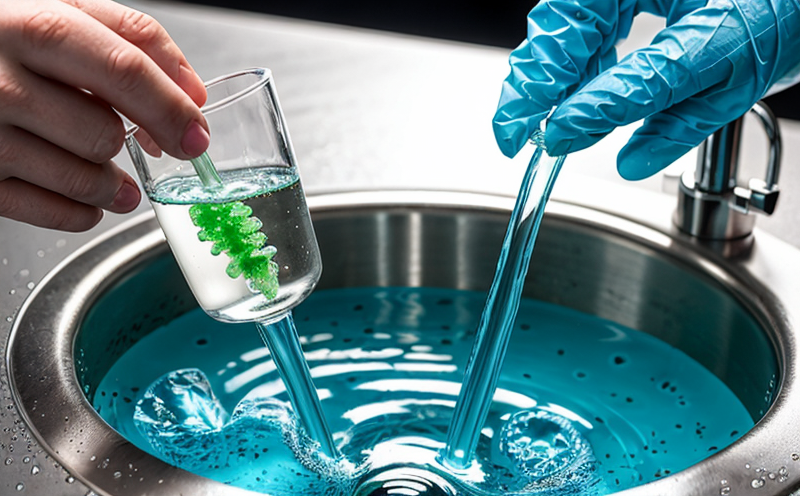ISO 7932 Bacillus Cereus Enumeration Test in Water
The ISO 7932 standard provides a robust methodology for enumerating Bacillus cereus in water samples, ensuring the safety and quality of drinking water. This test is particularly important given that Bacillus cereus spores are widely prevalent in the environment and can form vegetative cells under suitable conditions, leading to foodborne illnesses if present in high concentrations.
The enumeration process involves several critical steps, starting with proper sample collection and preservation. Samples should be collected using aseptic techniques to prevent contamination from other microorganisms. Preservation methods include refrigeration or the addition of inhibitors to halt spore germination. Once collected, samples are transported under controlled conditions to our laboratory for analysis.
The ISO 7932 protocol specifies that water samples must undergo two stages: initial dilution and plating on selective media. Initially, the sample is diluted in a nutrient broth to enhance the detection of low levels of Bacillus cereus. After incubation, colonies are counted using a stereomicroscope or automated colony counter. This process ensures accurate enumeration even when spore concentrations are very low.
For accurate results, our laboratory employs advanced microbiological techniques and state-of-the-art equipment, including fluorescence microscopy for identifying Bacillus cereus colonies on selective media. The use of selective media further enhances the specificity of the test by inhibiting the growth of competing microorganisms, thus providing a clear count of Bacillus cereus.
The significance of this test extends beyond just regulatory compliance; it plays a crucial role in maintaining public health and ensuring consumer confidence. By adhering to ISO 7932 guidelines, we provide reliable data that can inform decisions about water treatment processes and product formulations.
Our expertise in microbiological testing allows us to offer additional services such as advanced pathogen detection, antimicrobial efficacy testing, and other specialized tests aligned with international standards. These complementary services ensure a comprehensive approach to ensuring the safety of water supplies and related products.
Customer Impact and Satisfaction
The ISO 7932 enumeration test is a key component in maintaining high-quality water supplies, which directly impacts public health and customer satisfaction. By detecting Bacillus cereus at low levels, our services help clients meet stringent regulatory requirements and enhance their product reputation.
Our laboratory’s commitment to accuracy and reliability ensures that results are trusted by both industry professionals and the general public. This trust is further bolstered by our adherence to international standards such as ISO 7932, which guarantees consistent quality across different regions and laboratories.
We understand that accurate enumeration of Bacillus cereus in water samples can significantly influence customer confidence. Our services not only comply with regulatory requirements but also provide insights into potential risks, allowing for proactive measures to be taken. This proactive approach helps prevent outbreaks associated with waterborne pathogens and ensures the safety of end-users.
The results from our ISO 7932 tests are used by various stakeholders, including quality managers, compliance officers, R&D engineers, and procurement teams. These professionals rely on our data to make informed decisions about product formulations, raw material sourcing, and process optimization.
International Acceptance and Recognition
- The ISO 7932 standard is widely accepted in the global water testing community due to its rigorous methodology.
- Countries such as the United States, Europe, Canada, and Australia have adopted this standard for water quality assessment.
- Our laboratory adheres strictly to ISO 7932 guidelines, ensuring compliance with international standards and recognition from regulatory bodies worldwide.
- The use of this standard ensures that results are consistent and comparable across different regions, facilitating global trade in water-related products.
The acceptance of ISO 7932 extends beyond mere compliance; it reflects a commitment to excellence in microbiological testing. This international recognition enhances the credibility of our laboratory’s services and contributes to building trust with clients operating in diverse markets.
Competitive Advantage and Market Impact
The ability to accurately enumerate Bacillus cereus in water samples provides a significant competitive advantage for businesses involved in the production, distribution, or regulation of potable water. Our laboratory offers several key benefits:
- Regulatory Compliance: Ensuring that water supplies meet stringent regulatory standards is essential for maintaining compliance and avoiding legal issues.
- Risk Mitigation: Early detection of Bacillus cereus allows businesses to implement corrective actions promptly, minimizing the risk of contamination.
- Consumer Confidence: Providing reliable data on water safety helps build trust with consumers and stakeholders.
- Innovation Support: Our services support research and development efforts by offering accurate baseline data for product formulations and process improvements.
The ISO 7932 enumeration test is just one of many advanced services we offer. By leveraging this expertise, businesses can stay ahead in a competitive market, ensuring that their products meet the highest standards of quality and safety.





